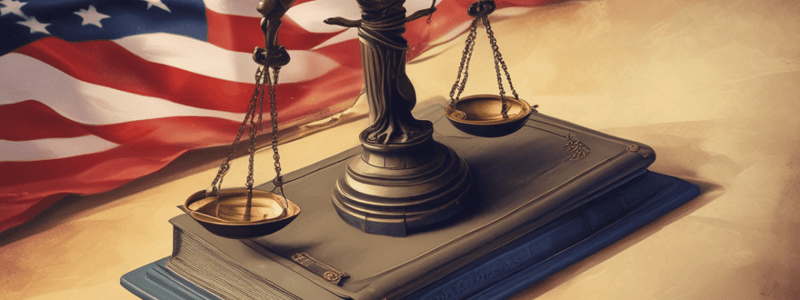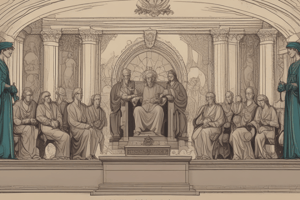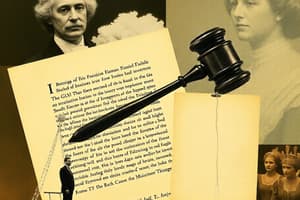Podcast
Questions and Answers
What is the principle of Iudicis est ius dicere sed non dare?
What is the principle of Iudicis est ius dicere sed non dare?
- The court and legislature have equal powers.
- The court's role is limited to interpreting the law, not making it. (correct)
- The legislature has the power to interpret the law.
- The court has the power to make laws.
What is the orthodox viewpoint in statutory interpretation?
What is the orthodox viewpoint in statutory interpretation?
- The court and legislature have equal roles in statutory interpretation.
- The court has a creative law-making function.
- The legislature has the final say in statutory interpretation.
- The court's role is limited to interpreting the law, without making any changes. (correct)
What is the main argument against the court's creative law-making function?
What is the main argument against the court's creative law-making function?
- The court does not have the necessary expertise.
- The court is not accountable to the people.
- The court is usurping the function of the legislature. (correct)
- The court is not elected by the people.
According to Pass and Prosper 57 v Du Plessis, what does the court's creative role not mean?
According to Pass and Prosper 57 v Du Plessis, what does the court's creative role not mean?
What is the theoretical foundation of the court's law-making role, according to Labuschagne?
What is the theoretical foundation of the court's law-making role, according to Labuschagne?
What is the result of the court applying the legislation, according to Labuschagne?
What is the result of the court applying the legislation, according to Labuschagne?
What is the primary goal of statutory interpretation within the framework of the Constitution?
What is the primary goal of statutory interpretation within the framework of the Constitution?
What is the role of the Courts in terms of the Constitution?
What is the role of the Courts in terms of the Constitution?
What is the result of the Constitution providing flexibility to the courts?
What is the result of the Constitution providing flexibility to the courts?
What is the core principle underlying modificative interpretation?
What is the core principle underlying modificative interpretation?
What is one of the factors that restricts judicial law-making during statutory interpretation?
What is one of the factors that restricts judicial law-making during statutory interpretation?
What is the purpose of considering factors that support and limit judicial law-making during statutory interpretation?
What is the purpose of considering factors that support and limit judicial law-making during statutory interpretation?
What is the principle that assumes the legislature does not intend to create futile legislation?
What is the principle that assumes the legislature does not intend to create futile legislation?
What occurs when the initial meaning of a text does not fully correspond to the purpose of the legislation?
What occurs when the initial meaning of a text does not fully correspond to the purpose of the legislation?
What is the purpose of Restrictive Interpretation?
What is the purpose of Restrictive Interpretation?
What does the maxim 'Cessante ratione legis, cessat et ipsa lex' mean?
What does the maxim 'Cessante ratione legis, cessat et ipsa lex' mean?
What is the outcome when the reason for a law ceases to exist?
What is the outcome when the reason for a law ceases to exist?
What was the outcome of the case R v Detody?
What was the outcome of the case R v Detody?
What is the basis for extending legislation to unspecified instances?
What is the basis for extending legislation to unspecified instances?
What is the court's stance on supplying an omission through interpretation by analogy?
What is the court's stance on supplying an omission through interpretation by analogy?
What is the limit of the judiciary's discretion in modifying the meaning of legislation?
What is the limit of the judiciary's discretion in modifying the meaning of legislation?
What happens when the court cannot modify the meaning of legislation?
What happens when the court cannot modify the meaning of legislation?
What is the consequence of failing to harmonize the text, purpose, and particular facts of a legislation?
What is the consequence of failing to harmonize the text, purpose, and particular facts of a legislation?
What was the applicant's request in the Ex Parte Dow case?
What was the applicant's request in the Ex Parte Dow case?
What did the plaintiff fail to prove?
What did the plaintiff fail to prove?
How is the Legislature's intention determined?
How is the Legislature's intention determined?
What happens when the use of legislation results in damage to a person's rights or property?
What happens when the use of legislation results in damage to a person's rights or property?
Why did the plaintiff's claim fail?
Why did the plaintiff's claim fail?
What is the tone of the disclaimer?
What is the tone of the disclaimer?




